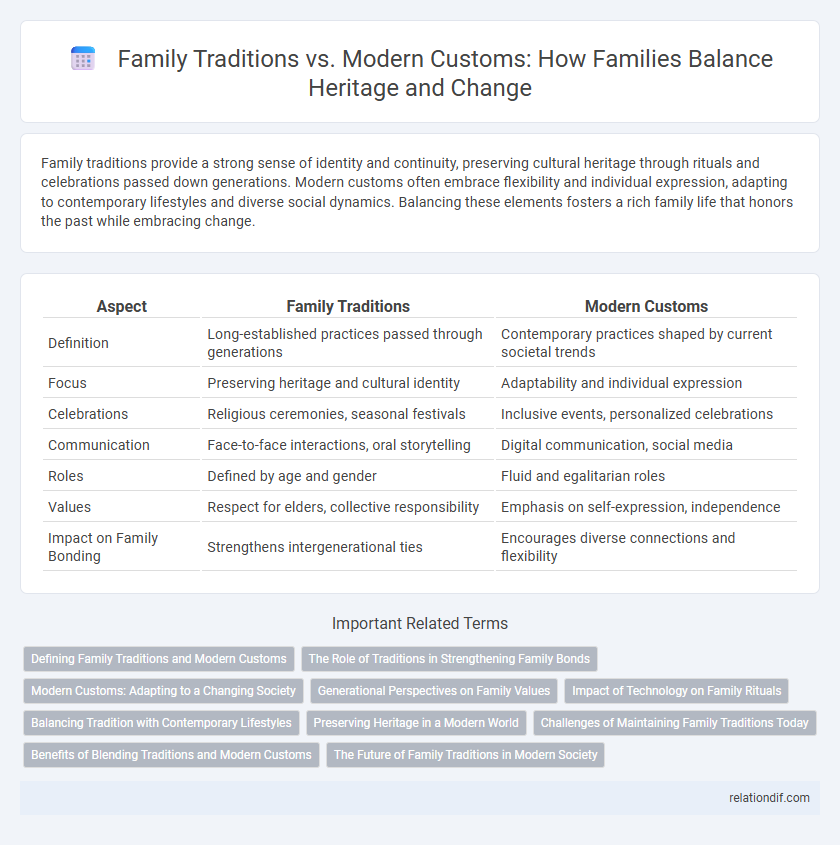Family traditions provide a strong sense of identity and continuity, preserving cultural heritage through rituals and celebrations passed down generations. Modern customs often embrace flexibility and individual expression, adapting to contemporary lifestyles and diverse social dynamics. Balancing these elements fosters a rich family life that honors the past while embracing change.
Table of Comparison
| Aspect | Family Traditions | Modern Customs |
|---|---|---|
| Definition | Long-established practices passed through generations | Contemporary practices shaped by current societal trends |
| Focus | Preserving heritage and cultural identity | Adaptability and individual expression |
| Celebrations | Religious ceremonies, seasonal festivals | Inclusive events, personalized celebrations |
| Communication | Face-to-face interactions, oral storytelling | Digital communication, social media |
| Roles | Defined by age and gender | Fluid and egalitarian roles |
| Values | Respect for elders, collective responsibility | Emphasis on self-expression, independence |
| Impact on Family Bonding | Strengthens intergenerational ties | Encourages diverse connections and flexibility |
Defining Family Traditions and Modern Customs
Family traditions consist of practices and rituals passed down through generations, such as holiday gatherings, storytelling, and cultural celebrations that reinforce family bonds and heritage. Modern customs often reflect contemporary values and lifestyles, including flexible holiday plans, personalized celebrations, and digital communication methods that accommodate diverse family structures. Defining family traditions involves recognizing rooted, consistent patterns, while modern customs emphasize adaptability and innovation in family interactions.
The Role of Traditions in Strengthening Family Bonds
Family traditions create a shared sense of identity and belonging that strengthens emotional connections across generations. Rituals such as holiday celebrations, weekly meals, and storytelling foster unity and provide stability in an ever-changing world. These customs nurture trust, support, and communication, reinforcing family bonds amid modern lifestyle shifts.
Modern Customs: Adapting to a Changing Society
Modern customs in family life emphasize flexibility and inclusivity, reflecting society's evolving values and diverse lifestyles. Technology integration, such as virtual gatherings, has reshaped how families maintain connections across distances. Shifts in gender roles and shared responsibilities redefine household dynamics, promoting equality and collaboration.
Generational Perspectives on Family Values
Family traditions often emphasize long-standing values such as respect, loyalty, and communal meals, which foster strong intergenerational bonds. Modern customs introduce flexibility and inclusivity, reflecting shifting societal norms and diverse family structures. Generational perspectives balance preserving heritage with adapting to contemporary lifestyles, shaping evolving family values.
Impact of Technology on Family Rituals
Technology has transformed family traditions by introducing virtual gatherings and digital celebrations, allowing relatives to connect across distances easily. While some traditional rituals have evolved or diminished, new customs such as online holiday video calls and shared digital photo albums preserve familial bonds. This shift enhances inclusivity but challenges the tactile and intimate aspects of classic family rituals.
Balancing Tradition with Contemporary Lifestyles
Family traditions provide a foundation for cultural identity and shared values, fostering a sense of belonging across generations. Modern customs encourage flexibility and adaptation, reflecting the diverse lifestyles and evolving priorities of contemporary families. Balancing tradition with contemporary lifestyles involves integrating meaningful rituals with current practices to maintain relevance while honoring heritage.
Preserving Heritage in a Modern World
Family traditions preserve cultural roots and reinforce identity by passing customs, stories, and rituals across generations. Modern customs incorporate technology and contemporary values, creating dynamic ways to celebrate heritage while adapting to current lifestyles. Balancing traditional practices with modern influences ensures the preservation of heritage within evolving family environments.
Challenges of Maintaining Family Traditions Today
Maintaining family traditions faces significant challenges today due to the fast-paced lifestyle and increased mobility that reduce regular gatherings. Modern customs often prioritize individual preferences and digital interactions, which can weaken the continuity of cultural rituals passed down through generations. Balancing time constraints and varying values within diverse family units complicates the preservation of long-standing traditions.
Benefits of Blending Traditions and Modern Customs
Blending family traditions with modern customs fosters a unique sense of identity that honors heritage while embracing contemporary values, promoting stronger intergenerational bonds. This fusion encourages adaptability and open-mindedness, enabling families to navigate societal changes while preserving meaningful rituals. Integrating both elements enhances emotional resilience and cultural awareness, benefiting individual growth and family cohesion.
The Future of Family Traditions in Modern Society
Family traditions anchor cultural identity and foster intergenerational bonds, yet modern customs increasingly reflect diverse lifestyles and technological influence. The future of family traditions in modern society hinges on adaptability, blending time-honored rituals with contemporary values to maintain relevance. Embracing inclusive celebrations and digital communication tools will ensure traditions evolve while preserving emotional connections.
Family traditions vs Modern customs Infographic

 relationdif.com
relationdif.com